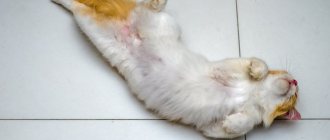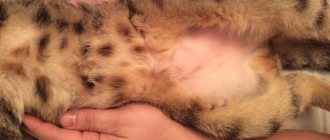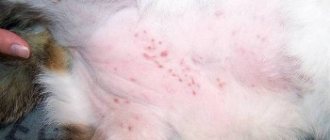The cat itches, chews itself, constantly licks itself: is this normal?
If an animal itches due to severe itching, then with sharp claws it damages the skin, causing infection.
During severe itching, severe irritation of pain receptors occurs, because of this the animal begins to lick and chew itself. The skin on the affected area turns red and wounds appear. The reasons for this condition are different. To relieve the symptom and understand what to do, the pet must be shown to a doctor.
When it's ok
Cats are clean creatures. They wash themselves after sleep and after eating. If your pet eats natural food, then after licking the fur it will smell like the food it ate.
The smell of eaten herring is especially strong. If the animal licks itself too much, then it needs a medical examination.
Signs of a pathological condition of an animal
The painful condition can be determined by itching of the skin or ears. With skin itching, you can notice how the cat itches a lot and tries to bite the source of its anxiety from under the skin with its teeth.
When the itching is localized in the ear, the cat tries to stick its paw deep into it to scratch.
During this period you may notice:
- constant scratching of the body with a plaintive meow;
- pronounced biting of the skin;
- hair loss, deterioration of its appearance;
- the appearance of dandruff, oily scales;
- the skin is covered with ulcers or red rashes in the form of small spots;
- parasites or their excrement are visible on the skin.
It is easy to help an animal if you notice deviations in behavior in time and take him to the clinic. An advanced disease is more difficult to cure.
External parasites
External parasites in pets
Not only flea attacks cause itching in a cat. In addition to fleas, other ectoparasites can also cause your pet to scratch frequently. So the culprit of otitis quite often becomes an ear mite that lives on the outside of the ear canal. The presence of such a bloodsucker is especially dangerous for pregnant cats.
The disease manifests itself as severe pain in the ear area, as well as the cat’s tendency to constantly scratch it. As a result, the pet is forced to endure great suffering, as wounds and bald patches appear in the affected area.
An itchy itch can also settle on the purr's head, the presence of which is accompanied by similar symptoms of itching. Only a veterinarian can detect a bloodsucker after conducting a microscopic examination of the skin.
Furry pets are often attacked by ixodid ticks. It is much more difficult to detect a hungry parasite than a satiated one. You can pull out the embedded pest using tweezers, making rotational movements counterclockwise.
The reason that a cat is itching can also be eggs laid by flies in the fur of a four-legged friend. After a while, larvae emerge from them, causing “their owner” great discomfort.
If excessive itching occurs, take your pet to the vet immediately.
Causes of itching in cats
It is easy to help an animal if you notice deviations in behavior in time and take him to the clinic.
A cat chews itself and itches when its skin itches.
There are several reasons that cause this condition:
- lichen;
- helminthiases;
- endocrine system problems;
- failure in the hormonal system;
- influence of stressful situations;
- the occurrence of skin diseases (fungus);
- there are insects in the fur that feed on blood;
- allergic reaction.
Be sure to read:
Sores on a cat’s neck that itch and hair fall out: normal or pathological, reasons, what to do
First, the animal is checked for fleas. This is the main reason why your pet starts to itch a lot. Flea bite marks persist for about 1.5 months, causing itching. If there are no insects in the animal's fur, it must be shown to a veterinarian.
Lice, lice, mites, flea dermatitis and other parasites that cause itching
Infection with ectoparasites occurs through outdoor shoes. The skin becomes inflamed if there are traces of scratches or small wounds on it.
If they are not treated in time, the animal will scratch them. Suppuration will appear, which will lead to baldness or sepsis. Sulfur ointment or powder is used to treat wounds. The drug in powder form called Yuglone is the most effective and is recommended for use by veterinarians.
Infection with helminths as a cause of itching
Itching due to worms
If the animal is infected with worms, then:
- the pet itches and licks the anus area because it feels severe discomfort in this place;
- appetite deteriorates, stool changes, changes occur in the digestive tract;
- there are noticeable changes in the cat’s behavior (he is too excited or in an apathetic state);
- the skin is dry and flaky, and the coat becomes dull.
Important! Kittens also suffer from worms, having contracted them from their mother. As a preventive measure, animals should be regularly given a drug against helminth infection.
Hormonal and endocrine disorders
Major disorders of the hormonal and endocrine system:
- Improper functioning of the thyroid gland . At the same time, the fur becomes tangled, itching and dandruff appear. In some cases, cats go bald.
- Cushing's syndrome . Due to a malfunction of the adrenal cortex, the skin loses its elasticity and becomes thinner. Comedones appear on the back and sides of the animal.
- Diabetes . _ The disease manifests itself in the form of local baldness, dry skin, seborrhea, and dull hair.
Ringworm, fungi and other types of skin mycoses
If an animal is sick with ringworm (trichophytia), then treatment begins immediately.
Similar symptoms occur when the skin and fur of an animal are affected by fungal and yeast diseases. Dermatomycosis does not pose a danger to people; it is treated with antifungal drugs.
If an animal becomes ill with ringworm (trichophytia), then treatment begins immediately, since this disease can also affect humans. In the affected areas, hair falls out and bald patches appear in the form of circles. Therefore, areas that the animal scratches heavily should be carefully inspected.
Infectious skin diseases
Often itching and irritation are caused by infectious diseases:
- Cheyletiellosis ( pityriasis scabies) occurs due to infection by a separate group of mites of the genus Cheyletiella. Insects look like small white dots moving around. You can find them along the back.
- Pyodermatitis is caused by bacteria. They infect not only the surface of the skin, but also penetrate into the deep layers of the epidermis.
- Notoedrosis is a contagious infectious disease that occurs due to ticks. Itchy mange is transmitted through contact with a cat.
- Demodectic mange is a rare disease spread by ticks.
Be sure to read:
A cat's belly is going bald: physiological and pathological reasons, what to do, how to treat it
Ear parasites
Due to improper care, parasites appear in the animal’s ears. Ear mites (otodectes) infect the ear canal and cause severe itching.
An unpleasant odor emanates from the ears, which is accompanied by dark-colored discharge. In the affected areas, the skin becomes red, the animal constantly scratches its ears and shakes its head. Huge wounds appear behind the ears due to constant scratching.
Body temperature rises. The progression of the disease can lead to severe inflammation of the outer ear and parotid space. In such a situation, the cat tilts its head to the side and constantly walks in this position.
Diagnostics
If your cat is itching a lot, but there are no fleas, you should immediately look for the cause. First of all, you should visit a veterinary clinic, because there are many factors that cause such behavior in your pet, and only a specialist will make an accurate diagnosis.
- The veterinarian will definitely take a detailed history of the disease - find out the age of the cat, its lifestyle, find out when the peak of the reaction occurs and the intensity of the itching, whether anti-flea treatment and deworming were carried out, how much time has passed since the last vaccination.
- Examine areas of irritation to determine the type of skin reaction - identifying alopenia, plaques, sores, granulomas. They especially carefully check the ear canal and the space between the fingers - the most common places for allergies to manifest.
- To identify a skin disease or dermatitis, the veterinarian will conduct tests: by combing, taking scrapings from the skin for microscopic examination, an adhesive tape test (for lice, lice), examination of earwax to detect ear mites, and cytological examination of smears.
Also read the article about why a cat can scratch itself until it hurts.
Treatment at home
Treatment at home includes taking medications and following a special diet.
Medicines for helminths
The drug is selected depending on the type of disease:
- Scabies from flea bites is treated with special drops and sprays. Anti-flea shampoos are used during bathing. Then a flea collar is put on the animal.
- Itching caused by fungal infections is eliminated with drugs from the griseofulvin group. The antifungal agent is applied externally. You can also get vaccinated.
- To get rid of ticks, acaricidal substances are used in the form of drops, sprays and shampoos. Drops against ear mites are instilled into the ears.
- To eliminate allergic reactions, it is necessary to remove the allergen from the diet and care products. For further treatment, antihistamines are used.
- Deworming medications help get rid of worms. During the examination, the doctor identifies what type of worms have affected the intestines and prescribes appropriate treatment.
- Dermatosis, otitis media and other infectious diseases are treated with antibiotics and anti-inflammatory drugs. To strengthen the immune system, the animal is prescribed vitamins A and B and immunostimulating drugs.
- Allergic dermatitis and ear scabies are treated with Stronghold. This drug is released in the form of drops that are applied to the animal’s neck. It also helps with flea bites.
Veterinarian advice
Despite the risks of being outside, the cat needs fresh air, so you should not limit its freedom. Since infections and parasites are transmitted through hands or from other animals, preventative treatment against parasites should be carried out regularly.
Veterinarian advice:
- The animal must be kept clean.
- A good immune system will protect your cat from any infection. The key to health is proper and balanced nutrition.
- To prevent allergies, you should not include smoked and salty foods in your diet. Sweets are also prohibited.
- A change of owner or a sharp change in attitude towards a pet leads to stress and illness. A pet needs to be loved, cared for, and given enough attention.
Be sure to read:
A cat's hair is falling out: reasons, what to do during shedding, treatment of baldness, approved medications
The cat licks and itches, but there are no fleas
A signal about the development of the disease can be constant licking of fur, scratching and excessive attentiveness to one’s appearance. Often the cat owner thinks that the pet has fleas, but when examining the fur, it is clear that this is not the reason.
Possible causes of itching:
- allergy;
- fungal diseases;
- hormonal diseases;
- hypo- and vitamin deficiencies;
- change of diet.
The cat licks itself vigorously and goes bald
Sometimes itching occurs for psychogenic reasons. Increased licking and scratching occurs when the animal is stressed. This is often observed when an individual requires mating. Taking sedatives will help calm your pet.
Cat licks after sterilization
Cats always try to lick wounds, sores and other skin lesions. After sterilization, a seam remains, which itches and itch, so the animal scratches and licks it. To prevent bleeding or other serious complications, a surgical collar is placed on the cat.
What to do if your cat is constantly licking
It can be difficult to diagnose why an animal constantly licks itself. First, the cat is checked for fleas, then it is analyzed whether the diet or care products have changed.
With a skin disease, the animal often shakes its head and licks itself until it bleeds. Only a doctor can diagnose the disease, so the pet must be taken to the clinic immediately. Based on the scrapings taken, they will be able to identify mites or fungal spores.
Stress
Psychogenic causes of itching also need to be considered; they are possible. Cats are not resistant to stress, moving, scandals in the house, severe fright - all this can cause disturbances in the functioning of the cat’s body, including leading to itching and the desire to scratch constantly.
The cat needs to be given sedatives and sedatives for a certain period, but they should not be abused.
Among the listed reasons, there are no particularly dangerous ones. Basically, they can be eliminated if you contact a specialist in time and follow all his recommendations and treatment prescriptions. Combing cannot be started.
Prevention of itching: does it exist at all, and what can be done?
Itching is caused by various factors, so following a number of prevention rules will help protect your cat from scratching:
- Poison worms in a timely manner. This will also help protect children who constantly play with animals. You should not give your cat raw foods: fish, meat.
- After each walk, inspect the animal for abrasions. Treat detected wounds with iodine or other disinfectants.
- To avoid infection with parasites, the cat should not be allowed to come into contact with other animals.
- Disinfect the cat litter box regularly.
- The transition to a new food should be carried out gradually.
- Do not punish your cat for minor offenses: this will prevent stress.
Step-by-step algorithm for exterminating insects
It is necessary to prepare before carrying out the procedure to rid your cat of fleas. This requirement also applies to pets. This needs to be done correctly. Otherwise, it will not be possible to destroy all fleas and repeated treatment will be required.
The step-by-step procedure is as follows:
- The animal must be combed using a comb or a special comb. After this, it is treated with the selected product.
- It is necessary to disinfect the pet's sleeping place. It is better to throw out the old litter and replace it with a new one. If this is not possible, then it is boiled. This will help destroy fleas and parasite eggs living in it.
- Treat the apartment with an anti-flea agent. As such, if there is no other option, it is recommended to add 5 to 8 drops of mint or tansy essential oil to the water for washing floors. If necessary, the process can be repeated.











